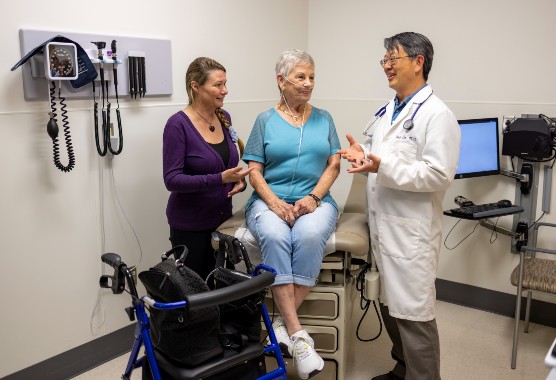Mitral Valve Prolapse (MVP)
Our Heart and Vascular Center specialists diagnose and treat mitral valve prolapse using leading-edge techniques. Our team works with you to develop an individualized treatment plan, prevent complications and maximize your quality of life.
Medically reviewed on June 20, 2023.

Understanding Mitral Valve Prolapse
The mitral valve allows blood to flow between your heart’s left atrium, one of its upper chambers, and your left ventricle, one of its two lower chambers.
With mitral valve prolapse, the valve’s two leaflets, or flaps, don't close evenly. When your heart contracts, these floppy valves bulge (prolapse) back into your left atrium. This leaky heart valve can cause blood to seep back into the atrium (regurgitation).
Symptoms of Mitral Valve Prolapse
If you have mitral valve prolapse, you may not have symptoms unless your blood flow is significantly reduced.
Common Symptoms
If you develop mitral valve prolapse, your symptoms might include:
- Fast or irregular heartbeat (arrhythmia)
- Dizziness or lightheadedness
- Shortness of breath, especially during exercise or when you lie flat
- Fatigue
Emergency Symptoms
Call 911 immediately if you experience symptoms of a heart attack or stroke, including:
- Chest pain or pressure
- Face drooping
- Arm weakness
- Difficulty speaking
Causes of Mitral Valve Prolapse
You may have been born with mitral valve prolapse or it developed with age. Possible causes of mitral valve prolapse include:
Rheumatic Heart Disease
Rheumatic heart disease can cause your heart valve to scar and narrow.
Myxomatous Valve Disease
Myxomatous valve disease is when the connective tissue of your mitral valve starts falling apart.
Endocarditis
After a severe blood infection, you may develop endocarditis, or inflammation of your heart’s inner lining. Endocarditis can damage the leaflets in your mitral heart valves.
Risk Factors for Mitral Valve Prolapse
You may have greater risk for mitral valve prolapse if you have one or more of the following risk factors:
Biological Sex
Women are more likely than men to have mitral valve prolapse.
Family History
If your family has a history of mitral valve prolapse, you may be at higher risk for mitral valve prolapse.
Grave’s Disease
Grave’s disease is an autoimmune disorder that causes your thyroid gland to become overactive.
Marfan Syndrome
Marfan syndrome affects your connective tissue. It can increase your risk for mitral valve prolapse.
Radiation Treatment
Radiation treatment for cancer can increase your risk of having thickened and narrow heart valves.
Mitral Valve Prolapse Diagnosis
We aim to diagnose and treat mitral valve prolapse early to help prevent complications such as heart attack or stroke. Mitral valve prolapse may also lead to irregular heart rhythms such as atrial fibrillation or ventricular fibrillation.
During testing, your physician will do a thorough physical evaluation. They will also ask you about your medical history and symptoms.
When listening to your heart, your physician may hear abnormal heart sounds, such as a click or murmur.
Your physician will confirm mitral valve prolapse using an echocardiogram, which creates an image of your heart with high-frequency sound waves (ultrasound). They may also order an exercise test to determine how physical activity affects how your heart valves work.
Treatments for Mitral Valve Prolapse
Your physician will discuss various treatment options with you along with the expected outcomes from treatment.
Medications
Your physician may prescribe medication(s) to prevent complications of mitral valve prolapse. These include drugs that prevent arrhythmias or thin your blood to prevent blood clots.
Transcatheter Edge-to-Edge Repair (TEER)
This procedure uses a catheter to implant a small clip that attaches to your mitral valve and helps it close more completely.
Mitral Valve Repair or Replacement Surgery
Depending on the extent of damage to your mitral valve and your underlying causes, your physician may recommend surgery to repair or replace your mitral valve. Our minimally invasive approaches avoid cutting into your sternum. Instead, we perform the operation through key-hole incisions between your ribs with a camera and robotic assistance.
Transcatheter Mitral Valve Replacement (TMVR)
During TMVR, we use a catheter (a thin, flexible tube) to insert a new mitral valve in your heart. This procedure is one of the least invasive methods for mitral valve replacement and offers an alternative to open heart surgery.
You can rely on our leading TMVR experts — the first heart team on the West Coast to perform TMVR by going through the femoral (leg) vein.
Request an Appointment
As Sacramento's No. 1 hospital, you'll benefit from unique advantages in primary care and specialty care. This includes prevention, diagnosis and treatment options from experts in 150 specialties.
Referring Physicians
To refer a patient, submit an electronic referral form or call.
800-4-UCDAVIS
Patients
Call to make an appointment.
Consumer Resource Center
800-2-UCDAVIS

Ranked among the nation’s best hospitals
A U.S. News & World Report best hospital in cardiology, heart & vascular surgery, diabetes & endocrinology, ENT, geriatrics, neurology & neurosurgery, and pulmonology & lung surgery.

Ranked among the nation’s best children’s hospitals
U.S. News & World Report ranked UC Davis Children’s Hospital among the best in pediatric nephrology, orthopedics*, and pulmonology & lung surgery. (*Together with Shriners Children’s Northern California)

Ranked Sacramento’s #1 hospital
Ranked Sacramento’s #1 hospital by U.S. News, and high-performing in aortic valve surgery, back surgery (spinal fusion), COPD, colon cancer surgery, diabetes, gynecological cancer surgery, heart arrhythmia, heart failure, kidney failure, leukemia, lymphoma & myeloma, lung cancer surgery, pacemaker implantation, pneumonia, prostate cancer surgery, stroke, TAVR, cancer, orthopedics, gastroenterology & GI surgery, and urology.

The nation’s highest nursing honor
UC Davis Medical Center has received Magnet® recognition, the nation’s highest honor for nursing excellence.

World-class cancer care
One of ~59 U.S. cancer centers designated “comprehensive” by the National Cancer Institute.

A leader in health care equality
For the 13th consecutive year, UC Davis Medical Center has been recognized as an LGBTQ+ Healthcare Equality Leader by the educational arm of America’s largest civil rights organization.

